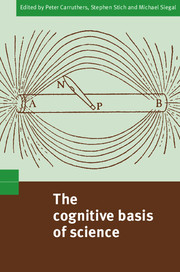Book contents
- Frontmatter
- Contents
- List of contributors
- Preface
- 1 Introduction: what makes science possible?
- Part one Science and innateness
- Part two Science and cognition
- 5 Science without grammar: scientific reasoning in severe agrammatic aphasia
- 6 Causal maps and Bayes nets: a cognitive and computational account of theory-formation
- 7 The cognitive basis of model-based reasoning in science
- 8 Understanding the role of cognition in science: the Science as Category framework
- 9 Theorizing is important, and collateral information constrains how well it is done
- 10 The influence of prior belief on scientific thinking
- 11 Thinking about causality: pragmatic, social and scientific rationality
- Part three Science and motivation
- Part four Science and the social
- References
- Author index
- Subject index
10 - The influence of prior belief on scientific thinking
Published online by Cambridge University Press: 23 November 2009
- Frontmatter
- Contents
- List of contributors
- Preface
- 1 Introduction: what makes science possible?
- Part one Science and innateness
- Part two Science and cognition
- 5 Science without grammar: scientific reasoning in severe agrammatic aphasia
- 6 Causal maps and Bayes nets: a cognitive and computational account of theory-formation
- 7 The cognitive basis of model-based reasoning in science
- 8 Understanding the role of cognition in science: the Science as Category framework
- 9 Theorizing is important, and collateral information constrains how well it is done
- 10 The influence of prior belief on scientific thinking
- 11 Thinking about causality: pragmatic, social and scientific rationality
- Part three Science and motivation
- Part four Science and the social
- References
- Author index
- Subject index
Summary
I should start by defining the kind of scientific thinking that I will be talking about in this chapter. It is not, for example, the thinking that scientists mostly do. Most scientific activity is mundane and repetitious, so most thinking is probably the day-dreaming that goes on while waiting for instruments to produce data or computer programs to run their analyses. It is not, in general, the creative process which leads to sudden breakthroughs, although I shall speculate a little on this matter. What I will really focus on is the processes of hypothetical and deductive reasoning that underlie the testing of hypotheses and the interpretation of evidence. This kind of reasoning has been extensively studied by psychologists, particularly over the past thirty years or so. (For recent reviews and discussions see Evans, Newstead and Byrne, 1993; Evans and Over, 1996; Manktelow, 1999; Stanovich, 1999; Schaeken et al., 2000.)
Experimental research on human reasoning generally consists of giving people tasks in the laboratory for which a correct answer can be computed according to a standard normative system such as propositional logic. Typically such experiments may manipulate both the logical structure of problems and a variety of non-logical factors such as problem content and context, instructional set, and so on. This kind of research has led broadly to three kinds of finding. First, intelligent adults (university students) untrained in logic make many errors on these tasks.
- Type
- Chapter
- Information
- The Cognitive Basis of Science , pp. 193 - 210Publisher: Cambridge University PressPrint publication year: 2002
- 11
- Cited by

